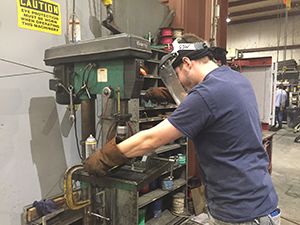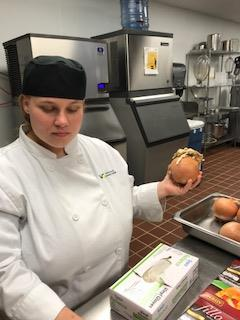WBL for Students
What is Work-Based Learning (WBL)?
Work-Based Learning (WBL) is a great learning opportunity for students to enhance employable skills and competencies pertinent to their fields of study. While gaining work experience, students can network with professionals, develop references for the future employment opportunities, and earn college credit.
Benefits for Students

- Earn college credit toward graduation.
- Establish a clear connection between college and employment.
- Clarify career goals before graduation.
- Increase motivation/appreciation for staying in school.
- Integrate classroom learning with related work experience.
- Build self-confidence as a professional.
- Demonstrate employable skills.
- Participate in authentic, job-related tasks.
- Assess and understand the expectations of the workplace.
- Establish professional contacts for future employment.
Eligibility
Work-Based Learning is considered an academic course; therefore, it has to be approved by the program head and your advisor. Please contact your academic advisor to see if you qualify for Work-Based Learning.
If you qualify, you must also go through the typical hiring process per your employer. Employers are not required to pay WBL students. However, some employers may provide monetary compensation.

To be eligible, students must:
- Be enrolled in a program of study that either requires WBL or offers WBL as a major elective.
- Maintain a cumulative GPA of 2.0 or higher, depending upon department.
- Complete a minimum of 9 credit hours in the major requirements area of their program of study.
- Complete the prerequisites for their program of study.
- Have at least 1 credit of major elective hours remaining.
- Obtain approval from their faculty advisor.
- Have legal authorization to work in the United States.
Credit Hour Requirement:
| Course | Credit Hour(s) | Work Hour(s) |
|---|---|---|
| WBL – 111
WBL – 121 |
1 credit hour | 160 Total hours worked |
| WBL – 112
WBL – 122 |
2 credit hours | 320 total hours worked |
| WBL – 113
WBL – 123 |
3 credit hours | 480 total hours worked |
Job Description
Work-Based Learning is an academic program. Credit is granted not for working but for the learning that occurs as a result of working. Job Descriptions are an effective method to assess the extent and value of this type of learning.
How to develop and write a Job Description?
Begin by reviewing the job duties and responsibilities with the supervisor at the worksite. Note areas where you can gain or develop new skills, increase your knowledge or improve your work ethic. It is important that you avoid broad general statements and confine your job description to tasks that can be accomplished during a single semester/term.
A job description must contain a list of general tasks or functions, and responsibilities of a position you, as the Work-Based Learning student, will be complete during the Work-Based Learning experience. For assistance with developing a substantive job description related to your program of study and WBL worksite, visit O*Net OnLine at www.onetonline.org
How to Apply
Students meeting the Work Based Learning Requirements who wish to enroll should complete the following steps:
- Meet with advisor, program head, or dean to review the WBL eligibility requirements (pdf).
- Have a confirmed work site and start date that has been approved by the Department/Program Head (students are responsible for their own transportation).
- Complete and submit a Work-Based Learning Application (JotForm)
- Complete and submit a WBL Registration Form (fillable PDF) with an advisor or program head.
- Pay tuition.
Work-Based Learning Eligible Programs:
- Accounting
- Air Conditioning, Heating and Refrigeration Technology
- Automotive Systems Technology
- Bioprocess Technology
- Business Administration
- Criminal Justice Technology
- Culinary Arts
- Electrical Systems Technology
- Electronics Engineering Technology
- Human Services
- Human Services – Addiction and Recovery Studies
- Human Services – Gerontology
- Information Technology
- Medical Office Administration
- Mechatronics
- Office Administration
- Paralegal Technology
- Pharmacy Technology
- Supply Chain Management
- Welding
